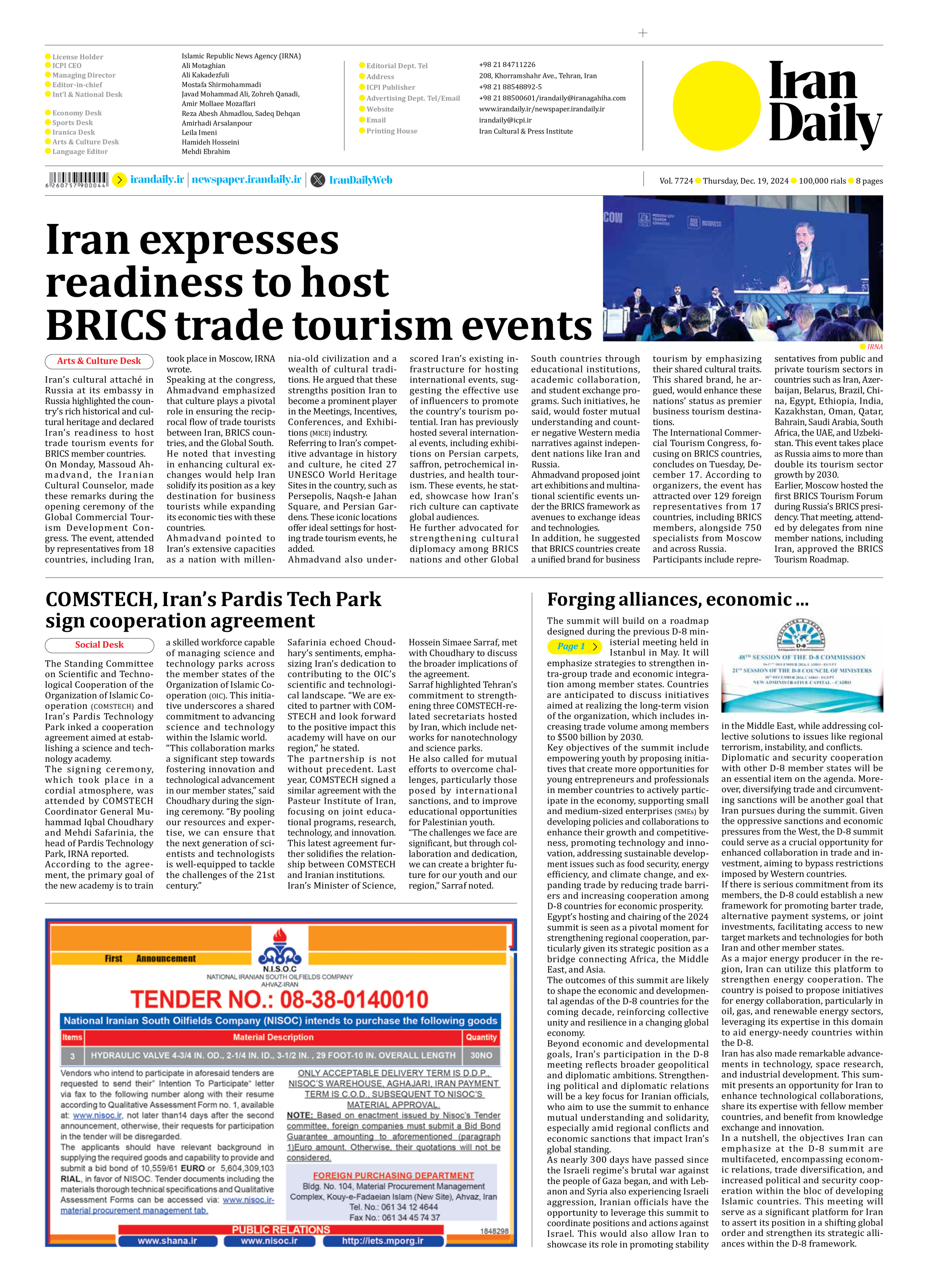
Forging alliances, economic ...
Page 1
The summit will build on a roadmap designed during the previous D-8 ministerial meeting held in Istanbul in May. It will emphasize strategies to strengthen intra-group trade and economic integration among member states. Countries are anticipated to discuss initiatives aimed at realizing the long-term vision of the organization, which includes increasing trade volume among members to $500 billion by 2030.
Key objectives of the summit include empowering youth by proposing initiatives that create more opportunities for young entrepreneurs and professionals in member countries to actively participate in the economy, supporting small and medium-sized enterprises (SMEs) by developing policies and collaborations to enhance their growth and competitiveness, promoting technology and innovation, addressing sustainable development issues such as food security, energy efficiency, and climate change, and expanding trade by reducing trade barriers and increasing cooperation among D-8 countries for economic prosperity.
Egypt’s hosting and chairing of the 2024 summit is seen as a pivotal moment for strengthening regional cooperation, particularly given its strategic position as a bridge connecting Africa, the Middle East, and Asia.
The outcomes of this summit are likely to shape the economic and developmental agendas of the D-8 countries for the coming decade, reinforcing collective unity and resilience in a changing global economy.
Beyond economic and developmental goals, Iran’s participation in the D-8 meeting reflects broader geopolitical and diplomatic ambitions. Strengthening political and diplomatic relations will be a key focus for Iranian officials, who aim to use the summit to enhance mutual understanding and solidarity, especially amid regional conflicts and economic sanctions that impact Iran’s global standing.
As nearly 300 days have passed since the Israeli regime’s brutal war against the people of Gaza began, and with Lebanon and Syria also experiencing Israeli aggression, Iranian officials have the opportunity to leverage this summit to coordinate positions and actions against Israel. This would also allow Iran to showcase its role in promoting stability in the Middle East, while addressing collective solutions to issues like regional terrorism, instability, and conflicts.
Diplomatic and security cooperation with other D-8 member states will be an essential item on the agenda. Moreover, diversifying trade and circumventing sanctions will be another goal that Iran pursues during the summit. Given the oppressive sanctions and economic pressures from the West, the D-8 summit could serve as a crucial opportunity for enhanced collaboration in trade and investment, aiming to bypass restrictions imposed by Western countries.
If there is serious commitment from its members, the D-8 could establish a new framework for promoting barter trade, alternative payment systems, or joint investments, facilitating access to new target markets and technologies for both Iran and other member states.
As a major energy producer in the region, Iran can utilize this platform to strengthen energy cooperation. The country is poised to propose initiatives for energy collaboration, particularly in oil, gas, and renewable energy sectors, leveraging its expertise in this domain to aid energy-needy countries within the D-8.
Iran has also made remarkable advancements in technology, space research, and industrial development. This summit presents an opportunity for Iran to enhance technological collaborations, share its expertise with fellow member countries, and benefit from knowledge exchange and innovation.
In a nutshell, the objectives Iran can emphasize at the D-8 summit are multifaceted, encompassing economic relations, trade diversification, and increased political and security cooperation within the bloc of developing Islamic countries. This meeting will serve as a significant platform for Iran to assert its position in a shifting global order and strengthen its strategic alliances within the D-8 framework.







